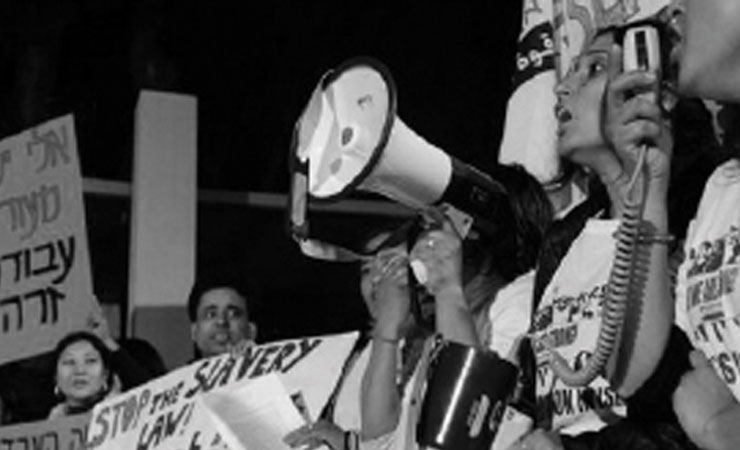By Ido Shkolnik
Although the feminist movement has resolutely led the equal rights struggle for years, inequality remains a stark problem—particularly in the labor market. While inequality exists throughout the entire labor market— including in traditional workplaces where workers hold permanent, full-time jobs under a single employer over an extended period of time— inequality is exacerbated as the terms of employment deviate from this formula. It is no wonder then that inequality is a rampant problem in the caregiving sector, where employees work in non-traditional workplaces with non-traditional employers and non-traditional hours.
In Israel, the caregiving sector comprises some 60,000 migrant caregivers who often fall outside the margins of the traditional Israeli labor market. Roughly half come from the Philippines, with the rest migrating from other Southeast Asian and Eastern European countries. These individuals are an essential part of an industry that provides care for Israel’s senior citizens, as well as other individuals requiring Long Term Care (LTC).
Because the Israeli legal code makes little mention of caregivers’ legal rights, it is unfortunately easy for employers to exploit them. Caregivers are the only group, for example, that are excluded from the protection of the Work Hours and Rest Law. This omission means that caregivers can be legally made to work 24 hours a day, 6 or 7 days a week, for minimum wage or less. Moreover, caregivers are often forced to pay an average of $8,500 in illegal mediation fees to Israeli placement agencies in order to secure their employment contracts. Earnings during their first several years of employment are therefore often used to pay back loans taken out to pay for these fees.
On initial inspection, it may appear that the caregiving field is gender-neutral. After all, male and female caregivers earn similar wages, have the same responsibilities, are employed under similar conditions, and are both required to pay outrageous mediation fees in order to be able to work in Israel. Moreover, because women are in much higher demand and tend to pay slightly lower mediation fees than their male counterparts, women may appear to be favored.
Despite this illusion of equality, female caregivers experience considerable gender-based discrimination. Job security is a common concern as many migrant caregivers are terminated if and when they become pregnant. This is quite problematic since female workers are often specifically sent to Israel in order to send remittances to support family members who remain in their home countries. Even when these women are not immediately terminated, they are frequently expected to continue working around the clock—an expectation that is particularly difficult to fulfill for pregnant women.
Even if these caregivers manage to remain employed through their pregnancy, they must still face several troubling dilemmas regarding their legal status in Israel once their babies are born. According to Ministry of the Interior procedures, migrant caregivers may continue working in Israel with their children only if they have been in Israel for less than 5 years and 3 months. Mothers are also required to find employers who are willing to hire them knowing their attention will be divided between the employer and the new child. Without official approval from an employer who is willing to agree to these terms, mothers are forced to make a difficult choice: they may either leave the country with their child at the end of their maternity leave, or are required to send the child home in order to stay and work. Further, women who stay in Israel with their new children are highly unlikely to be able to support themselves, their children, and their family back home with the meager wages that caregivers make.
Where are the fathers in this story? Most caregiver mothers who are in contact with Kav LaOved are single moms. The fathers are often not in Israel and have no active role in raising the child. In addition, since migrant caregivers are “live-in” and work 24 hours per day, it is virtually impossible for them to build a family. Moreover, the Ministry of Interior directives mandate that if two migrant caregivers are in a relationship, both cannot stay in Israel. It is therefore impossible for these women to share the duties of parenthood with their partners.
All women should be entitled to create a family at their own discretion—to do so is a basic, fundamental right. Unfortunately, female migrant caregivers in Israel do not have the liberty to exercise this right without being forced to consider the repercussions that this decision would have on their legal status and employability. Migrant caregivers undoubtedly fill an irreplaceable role in Israeli society, yet they are left unprotected and exposed to exploitation by holes in the Israeli legal code. The time has come to ensure that they are protected; to do so would mark a distinct step on the march to progress toward the advancement of all women’s rights, including the basic right to motherhood.
Ido Shkolnik is the Coordinator of Migrant Caregivers at Kav LaOved
Translated by Yarden Altshull


